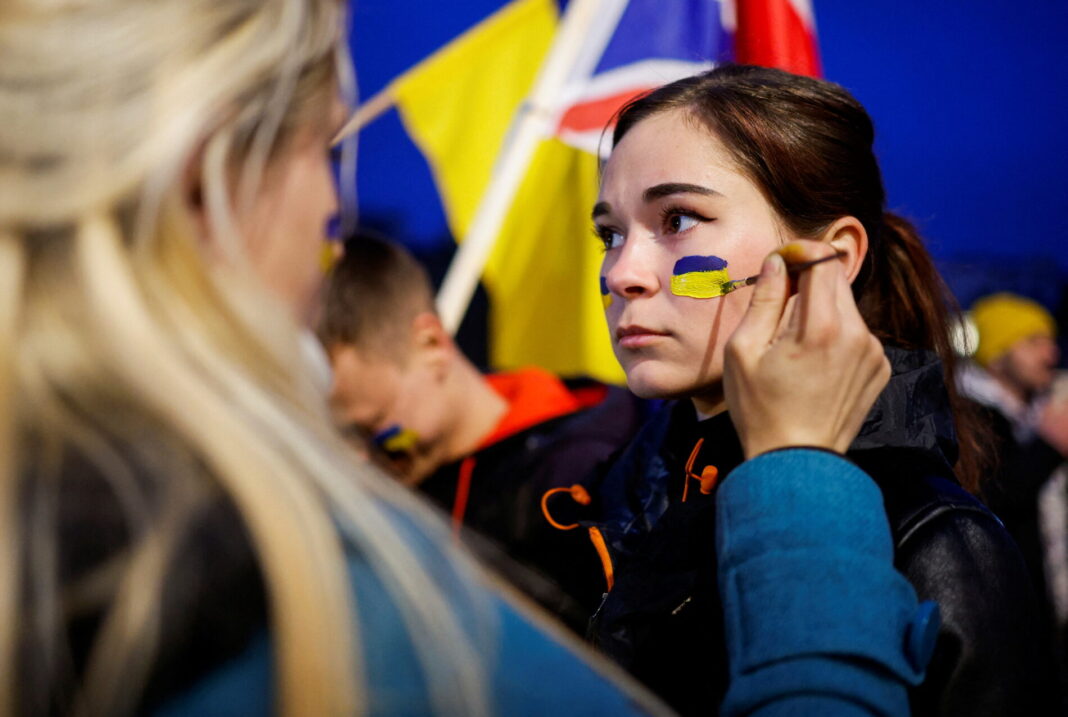People from all over the world have gathered outside Downing Street and in Trafalgar Square to scream, sing, cry, and show that they do care about the future of Ukraine. Here are some of their comments
Since the early days of democracy, protests have been an integral part of civilians’ exposing their opinion to the public. 25-28 February 2022 – anti-war protests on Downing Street 10 and Trafalgar Square, London, people from all over the world have gathered to scream, sing, cry, and show that they do care about the future of Ukraine, one of the most politically tricky countries of the last decade. Our correspondents had a chance to talk to participants of the protest to find out what led them to the meeting, whether they believed it was successful or not, and what is the key message that they wanted to translate to the outer world in these difficult times.
The number of protesters in London increased every day during this period. At first, it was easier to find Ukrainian and Russian-speaking participants in the crowd: those born in Ukraine but working or studying in England; those who used to work in Ukraine but were born in Europe; just people from Belarus, Russia and Latvia who were not indifferent. However, as the protests became more widespread, British, EU and various Asian citizens became more perceptible in these regards.
The main unifying thing is that people came to speak out against the war in Ukraine and the war in general. “I am here to scream because I need to scream“. People say they can’t just sit at home. It is essential for them to show their participation and support. Some stay up nights checking the news about their hometowns where their families are. Some just see the horror of war and can’t stand by. Either way, it is a question of action. Protesters go out to protest as a sign that they are taking action – the same message they send to state authorities: “take action“.
Protesters from Eastern Europe are also reaching out to Russians in Russia – they urge them to show their opposition to the war. While many of them understand the functioning of protests in authoritarian regimes (Ukrainians have the example of the Maidan and Belarusians remember the protests after the 2020 presidential election). People remember the human sacrifices, the ruined or taken lives. “Our governmental structures, with our silent agreement, do this; but the nation shouldn’t be to blame; we have to support of Ukrainians” – today, the human cost has spread beyond the regime.
When discussing the effectiveness of the protests, protesters see them as a symbol. “Protest may seem like nothing, but it is a kind of support” – they show Ukrainians that they are not alone in their struggle. Even a seemingly insignificant action proves powerful. They come to the protest and show their presence even on social media – the whole world sees it, the “spiral of silence” is broken, and fewer people are afraid to come out and express their opinion. Or they come to the protest just to sing – this action becomes a representation of Ukrainian culture that unites and makes people unbreakable.
However, a sense of belonging and support is not the only reason for participating in the protest. The protest does have an impact on national governments – in the early days, protesters demanded tougher sanctions and, for example, to cut Russia off from SWIFT. After only a few days of protests, this demand was already met. Now, in addition to pacifist slogans, the demand to arm Ukraine and protect its sky can be heard. However, many point out the ambiguity of such demands – they are seen as ways to unleash more and more war. However, a strategy of silence does not seem to be the answer: “It’s our duty to speak out now rather than wait for things to get worse“.
As seen above, being present at the meeting warms the hearts of people all across the globe, whether they are Ukrainians or not. So people gathered in the city center last week to feel unity, drive away from the despair and make themselves narrowly more comfortable in this situation, which is still hard to wrap a head around. People come together to sing their hearts out, discuss the situation and feel as if they belong in the community abroad. Arguably, protests outside the country in question are even more important than those inside it, as people far away from their homeland need to feel attached to the country’s political situation, feel like they can contribute to the change. People in the United Kingdom are first and foremost afraid of what is to come, afraid of the decisions that a person across the sea can make with no way to change it, and protests are an essential mechanism of change in these regards.
We, as writers, do not want to say that a protest is a must-have mechanism and expats should rush to the first protest that they see, but being mindful of a situation in a foreign country and contributing is something that certainly makes people feel better. Lastly, coming to a protest even as an outsider to a situation will provide you with insights on a crisis, allow you to see something through the radical lenses of people who feel something different from you, and it is an experience that might be fruitful for your broader political horizon and more diverse view on the world.
People from all over the world have gathered outside Downing Street and in Trafalgar Square to scream, sing, cry, and show that they do care about the future of Ukraine. Here are some of their comments




